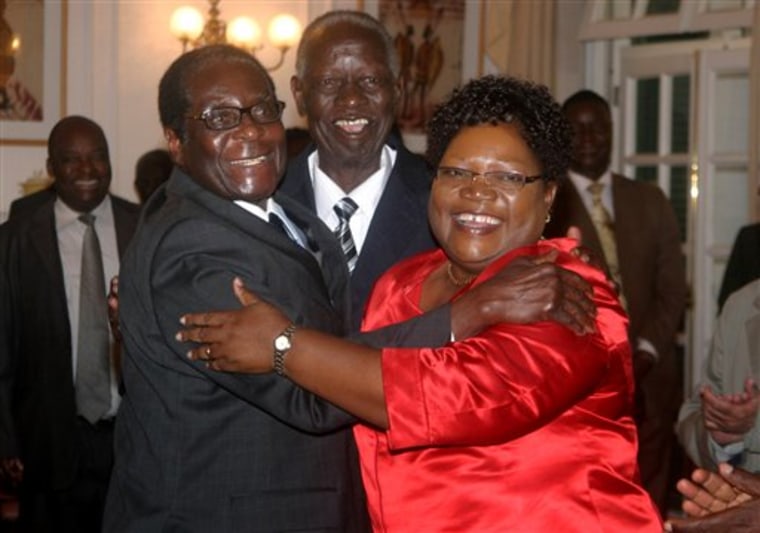President Robert Mugabe swore in two vice presidents Monday despite a deadlock in power-sharing talks with Zimbabwe's opposition movement, heightening tensions that are threatening to unravel the negotiations.
The opposition called the swearing-in ceremony an act of bad faith, and Mugabe's unilateral move was condemned by the European Union. British Foreign Secretary David Miliband said Europeans would "play no part in supporting a power grab by the Mugabe regime."
While Zimbabwe's politicians squabble, half the population — 5.1 million people — faces starvation, two-thirds of children are out of school and water shortages have caused to deadly cholera outbreaks in three parts of the country, aid groups say.
The political talks have stalled as Mugabe insists his party hold all key Cabinet posts.
Trying to save power-sharing deal
With opposition leader Morgan Tsvangirai threatening to abandon the talks, former South African President Thabo Mbeki was flying to Harare late Monday to try to save the power-sharing deal he brokered this summer after a disputed presidential election.
Justice Minister Patrick Chinamasa said on state television that the negotiations would resume Tuesday. Mbeiki's spokesman, Mukoni Ratshitanga, said all Zimbabwe factions had urged his intervention.
Mbeki has been chief mediator in the dispute that erupted after March elections broke the control of Parliament long held by Mugabe's party and gave Tsvangirai the most votes in the presidential ballot. Mugabe then claimed victory in a June presidential runoff after Tsvangirai dropped out over violence aimed at his supporters.
On Sept. 15, Mbeki persuaded the rivals to share power, with the opposition holding 16 Cabinet seats and Mugabe's party 15. But the two sides have been unable to agree on details of the new government, including which side would control which ministries.
An official list of Cabinet portfolios published Saturday gave Mugabe's party the ministries of defense, home and foreign affairs, justice, mining and land, among others. The opposition was listed with minor ministries, such as constitutional affairs and water management.
"That is not power sharing, it is power grabbing," Tsvangirai told thousands of supporters at a rally Sunday. He said Zimbabweans were prepared to "suffer some more" to get a more equitable agreement. Thousands of people raised their hands in agreement.
Not acting in good faith?
The choice of Joyce Mujuru and Joseph Msika as vice presidents was not in dispute, since the agreement gave those posts to Mugabe's party, but the opposition said the decision to go ahead with their inauguration showed Mugabe is not acting in good faith.
"This unilateralism will simply crush the country," opposition spokesman Nelson Chamisa said.
European Union ministers meeting in Luxembourg said they were keeping "close watch on the implementation of the agreement" signed by Mugabe and Tsvangirai. They said they would keep sanctions against Mugabe and some of his key officials until they saw proof the deal was being implemented properly.
"Things are certainly not going well," French Foreign Minister Bernard Kouchner said. "We are very worried about the situation ... We will certainly not abandon Mr. Tsvangirai. We can all see that Mr. Mugabe did not keep his promises."
New notes issued
Meanwhile, Zimbabwe's central bank issued new notes denominated at 50,000 Zimbabwe dollars Monday. Bank Governor Gideon Gono said on state radio the new bills would help people, but economists say the new banknotes were more likely to fuel inflation that already stands at an official 231 million percent.
The new bill is worth about $270, according to the official exchange rate of 185 Zimbabwe dollars to $1. But the black market rate of 6 million to $1 is more commonly used, which would make the new note worth less than a U.S. penny.
The bank also raised the daily withdrawal limit for individuals to 50,000 Zimbabwe dollars from 20,000, The Herald newspaper said. It said the limit for companies remained 10,000 dollars, to encourage them to use checks and credit cards.
State radio said the new notes were seen on the street before banks opened, saying this suggests corruption. Some bank officials are believed to have sold the notes to cronies of Mugabe who are enriching themselves off the economic crisis.
